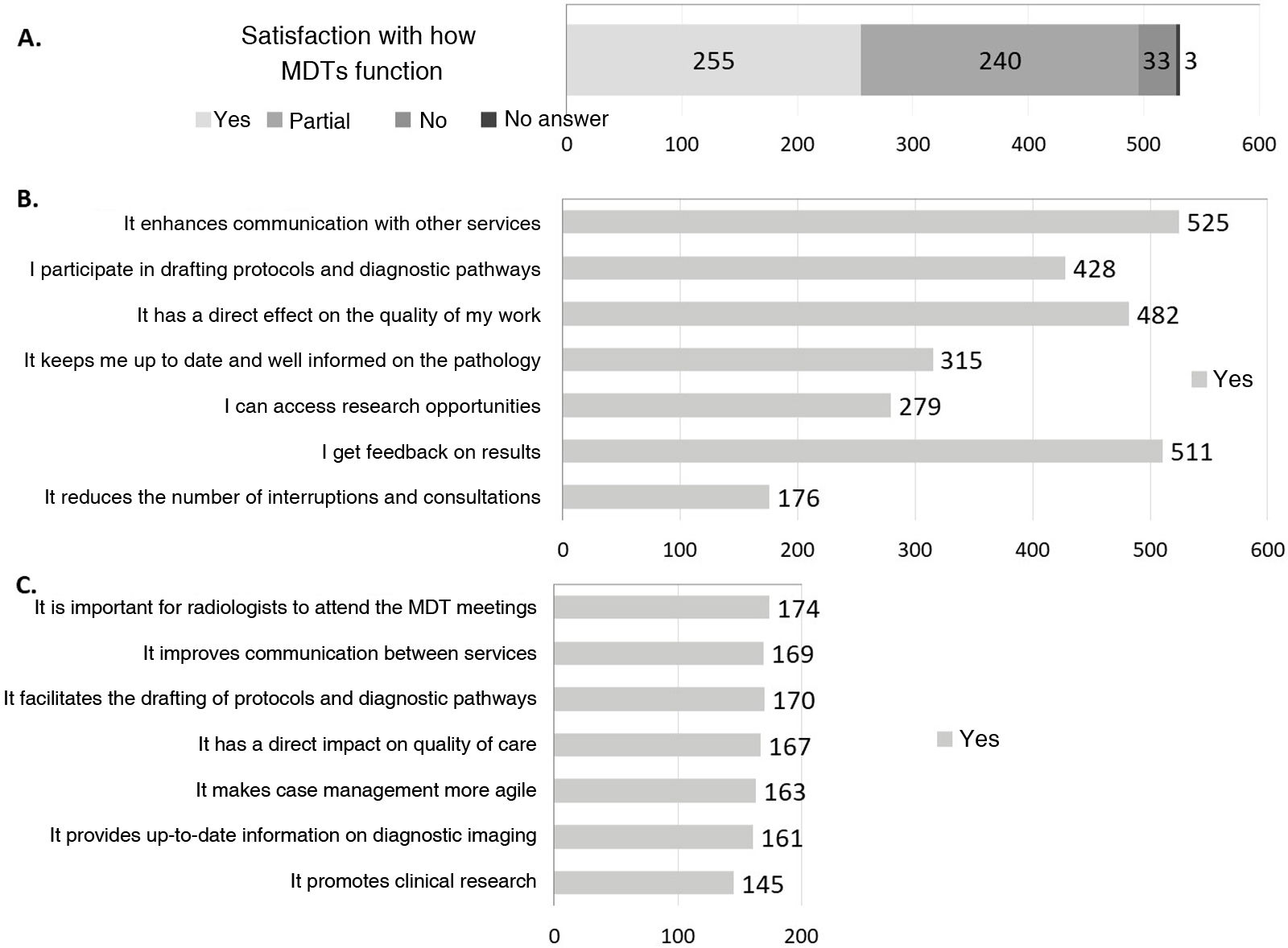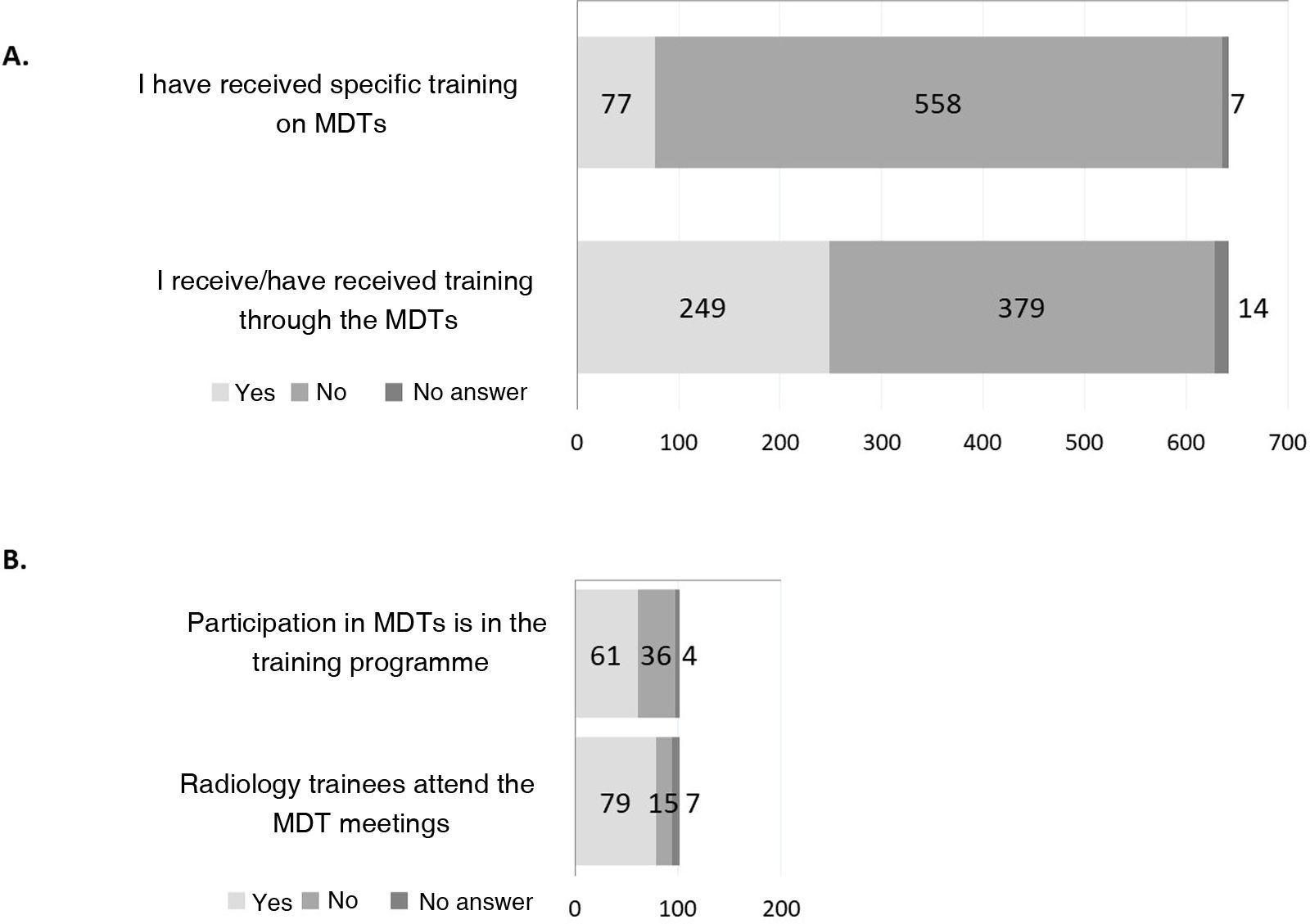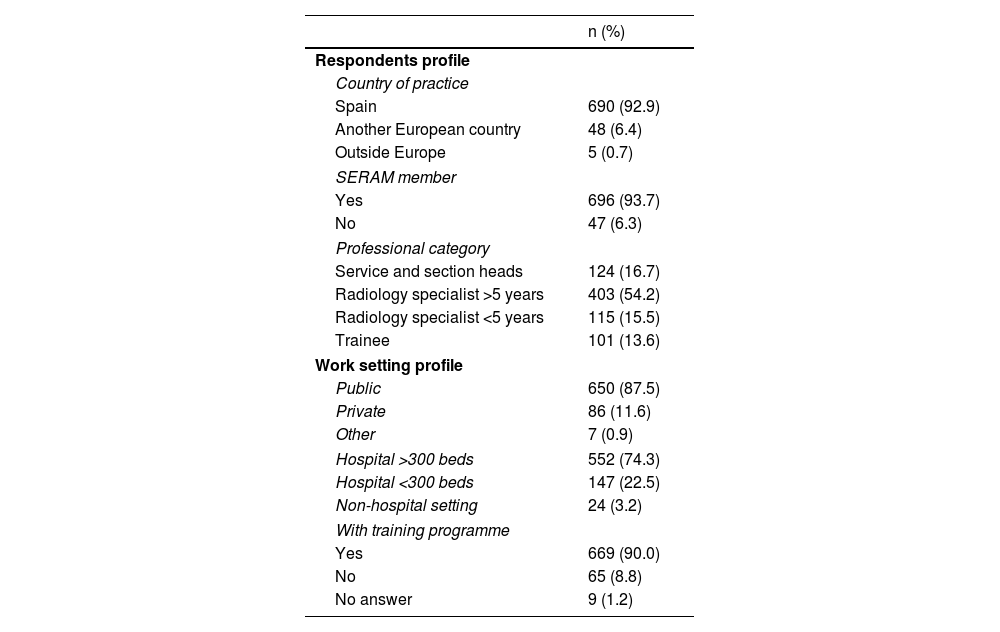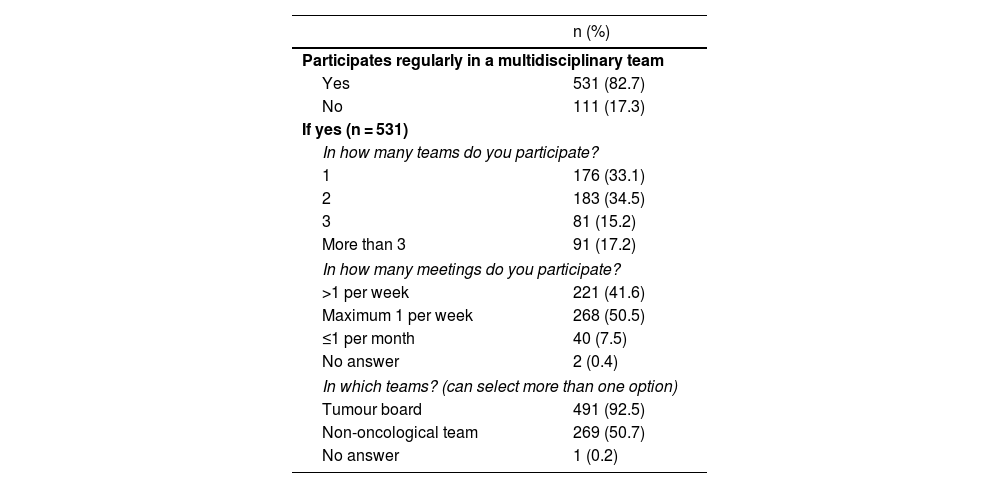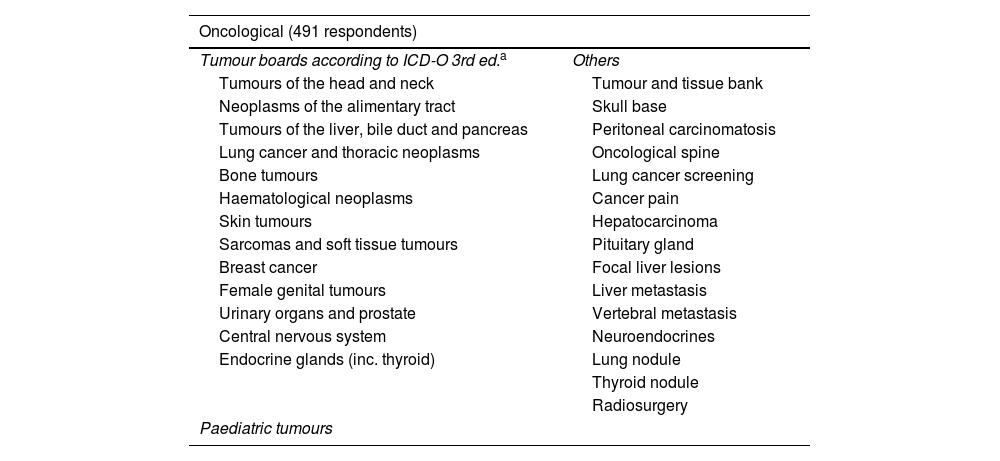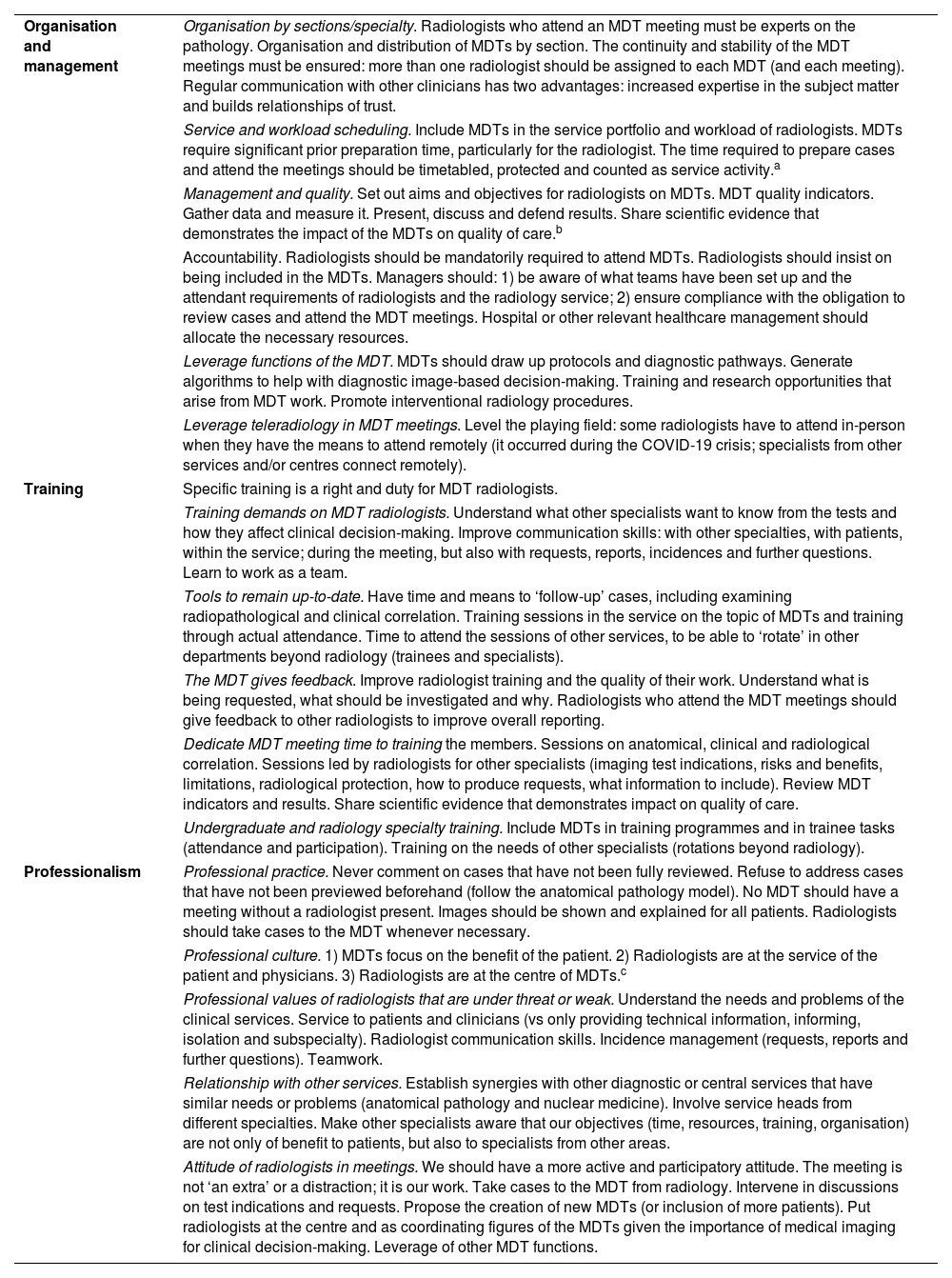The increasing participation of radiologists in multidisciplinary boards brings about advantages, challenges and specific needs. The aim of this paper is to identify the boards in which radiologists participate and to detect the needs, problems and opportunities that these boards pose for our specialty.
Methods and materialsThe Spanish Society of Medical Radiology (SERAM) conducted an ad-hoc survey that was distributed among members and through social networks. The results were analysed with Stata® v14.2 (StataCorp, Texas, USA).
ResultsBetween 15 November 2022 and 24 December 2022, we received 743 anonymous responses with 93.7% coming from SERAM members (642 radiologists and 101 radiology trainees). Among the specialists, 82.7% regularly participate in one or more boards (92.5% oncology/50.7% non-oncology/43.3% both), which implies two or more meetings per week for 41.6% of the respondents.
Both radiologists who regularly participate in boards and those who do not, are very positive about this aspect of professional activity and agree on its benefits. However, the specialists who do participate, lack enough allocated time and information to prepare cases prior to the meeting. Although attendance is often recorded (69.7%), it is generally not included in the work plan (20.5% of physicians and 30.8% of middle managers, p = 0.028).
Regarding operational functioning, according to 46.9% of respondents there is no record of imaging tests reviewed, and the handling of discrepancies within radiology departments is poor (written recommendations and review sessions are only available to 14.3% and 7.7% of respondents respectively).
ConclusionsThe radiologists surveyed report the high impact of multidisciplinary committees on their workload and clinical decisions. They mention a number of problems, some of which are specific to radiology, which can undermine efficiency and safety. These include work organisation, lack of time and problems of accessibility and the recording of imaging tests and other medical record data.
La creciente participación de los radiólogos en comités multidisciplinares conlleva ventajas, desafíos y necesidades específicas. El objetivo de este trabajo es identificar los comités en los que participan los radiólogos y detectar las necesidades, los problemas y las oportunidades que plantean estos comités a nuestra especialidad.
Material y métodosLa Sociedad Española de Radiología Médica (SERAM) realizó una encuesta ad hoc que fue distribuida entre los socios y a través de las redes sociales. Los resultados se analizaron con Stata® v14.2 (StataCorp, Texas, EE.UU.).
ResultadosEntre el 15/11/2022 y el 24/12/2022 se recibieron 743 respuestas anónimas, el 93,7% procedentes de miembros de la SERAM (642 radiólogos y 101 residentes de radiología). Entre los especialistas, el 82,7% participan regularmente en uno o más comités (92,5% oncológico / 50,7% no oncológico / 43,3% ambos), lo que supone dos o más reuniones por semana para el 41,6% de los encuestados.
Tanto los radiólogos que participan regularmente en comités como los que no lo hacen valoran muy positivamente esta parte de la actividad profesional y coinciden en los beneficios que aporta. Sin embargo, los especialistas que asisten carecen de suficiente tiempo asignado e información para preparar los casos antes de la reunión. Aunque la asistencia a los comités suele registrarse (69,7%), generalmente no se incluye en el plan de trabajo (20,5% de los facultativos vs 30,8% de los mandos intermedios, p = 0,028).
Respecto a la operativa de funcionamiento, según el 46,9% de los encuestados no hay registro de las pruebas de imagen revisadas, y el manejo de las discrepancias dentro de los servicios de radiología es deficiente (solo disponen de recomendaciones escritas y sesiones de revisión el 14,3% y el 7,7% de los encuestados, respectivamente).
ConclusionesLos radiólogos encuestados señalan el alto impacto de los comités multidisciplinares en su carga de trabajo y en las decisiones clínicas. Refieren diversos problemas, algunos específicos de la radiología, que pueden menoscabar la eficiencia y la seguridad. Entre ellos destacan los relacionados con la organización del trabajo, la falta de tiempo y los problemas de accesibilidad y registro de pruebas de imagen y otros datos de la historia clínica.











